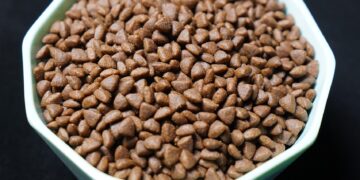The Top Benefits of Organic Dog Health Food Explained
Choosing the right food for your furry friend is more than just picking the most convenient or cheapest option. With a wide range of dog foods available in the market, organic dog health food has emerged as a beneficial choice for pet owners. In this article, we’ll explore the advantages of feeding your dog organic food and how it can contribute to a longer, healthier life for your pet.
Understanding Organic Dog Food
What Is Organic Dog Food?
Organic dog food refers to pet food made from ingredients that are certified organic. This means they are free from synthetic pesticides, fertilizers, antibiotics, hormones, and genetically modified organisms (GMOs). These ingredients are cultivated through organic farming practices, supporting eco-sustainability and reducing your pet’s exposure to potentially harmful chemicals.
How Is It Different from Regular Dog Food?
Unlike conventional dog food, organic options do not contain artificial colors, flavors, or preservatives. They are crafted with a focus on naturalness and purity to offer your canine companion a nutrient-rich diet that mimics their ancestral dietary habits.
Top Benefits of Organic Dog Health Food
1. Enhanced Overall Health
Organic dog food is rich in superior quality ingredients that provide a balance of essential nutrients. Feeding your dog organic food can lead to improved health outcomes, such as better digestion, a sleeker coat, and a strong immune system. The absence of artificial substances ensures your pet isn’t ingesting anything potentially detrimental to their health over time.
2. Lower Risk of Allergies and Sensitivities
Many dogs suffer from allergies or sensitivities caused by additives found in traditional pet foods. Organic foods are devoid of these chemicals, greatly reducing the chance of allergic reactions. This means less itching and discomfort for your dog and fewer vet visits for you.
3. Environmental Benefits
Organic farming practices are designed to use natural products and processes to enhance sustainability. By choosing organic dog food, you contribute to reducing the carbon footprint and promoting a healthier planet. Supporting organic products also encourages more manufacturers to consider environmentally friendly practices.
4. Support of Animal Welfare
Organic certification often also means better conditions for animals involved in the production of the food. Livestock are generally given more space to roam and access to the outdoors, enhancing their quality of life and, by extension, the quality of the product your dog consumes.
Choosing the Right Organic Dog Food
Ingredients to Look For
When selecting an organic dog food, it’s important to read the ingredients list. Ideal options should contain whole food ingredients like named meat sources, vegetables, and whole grains. Avoid products with unspecified meat sources or excessive amounts of fillers like corn and wheat.
Avoiding Common Pitfalls
Not all products marketed as organic are fully organic. Look for labels that specify “100% organic” or have a certification like the USDA Organic seal. Products labeled simply as “organic” can contain a minimum of 95% organic ingredients, and those specified as “made with organic ingredients” might only contain 70% organic ingredients.
Practical Tips for Integrating Organic Dog Food into Your Pet’s Diet
Transition Gradually
Switching your dog’s diet abruptly can lead to digestive upset. Gradually mix organic food with the current food over the course of several days to a week, increasing the proportion of organic food slowly.
Consider Your Dog’s Preferences and Needs
Each dog is unique, and what works for one may not work for another. Consider your dog’s age, weight, activity level, and any health issues when choosing an organic food. Palatability is also key; ensure the food is appealing to your pet to avoid wasting money on food they won’t eat.
Monitor Your Dog’s Reaction
As you transition to organic dog food, monitor your pet’s reaction to the new diet closely. Look out for improvements in energy levels, coat quality, and overall vitality, or any adverse reactions, adjusting the diet accordingly.
Conclusion
In a world where the quality of diet is directly linked to health, offering organic food to your dog can significantly enhance their well-being and lifespan. From boosting health to supporting ethical farming practices, the benefits of organic dog health food are comprehensive and worth considering for any pet owner dedicated to the care of their canine companion.














































